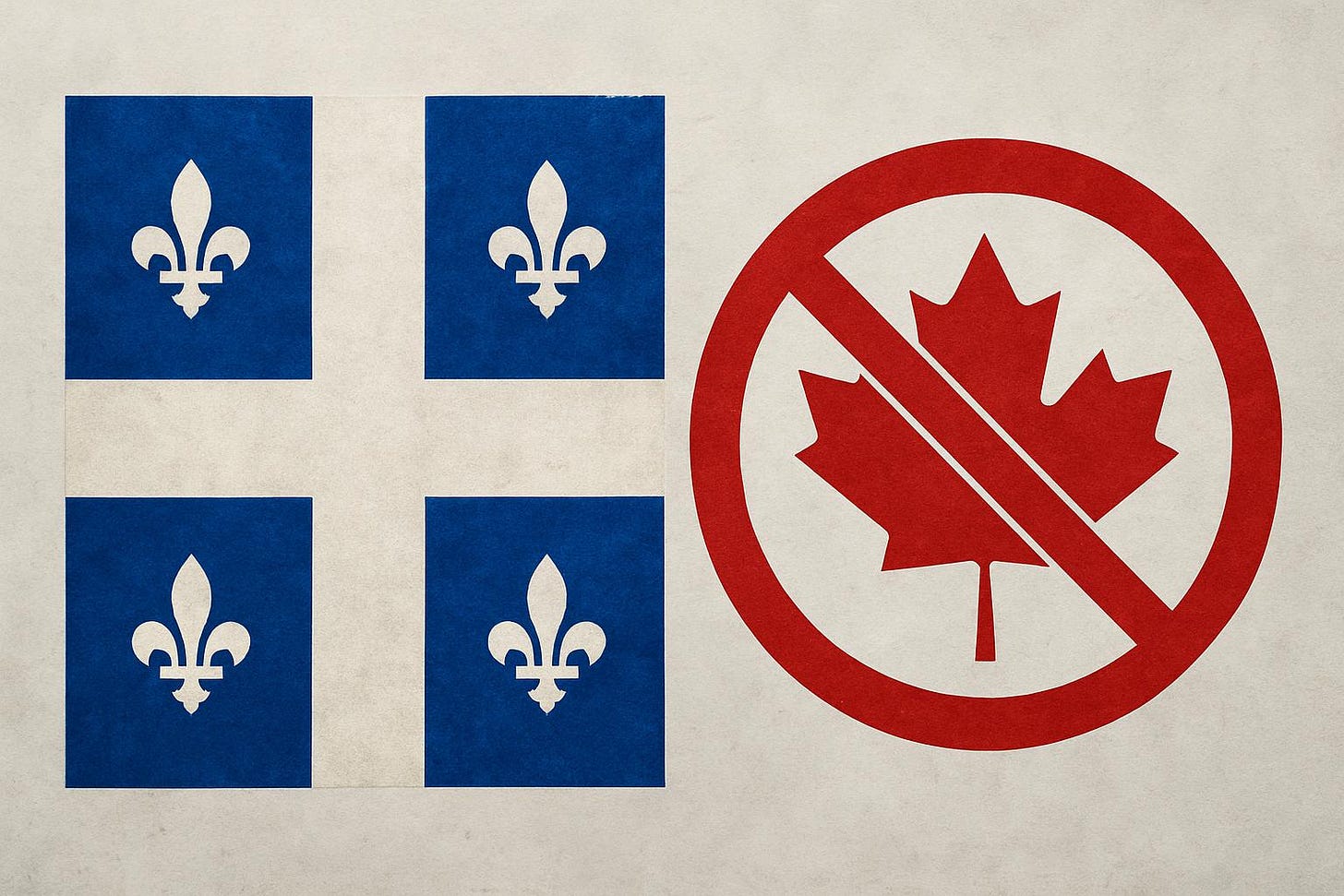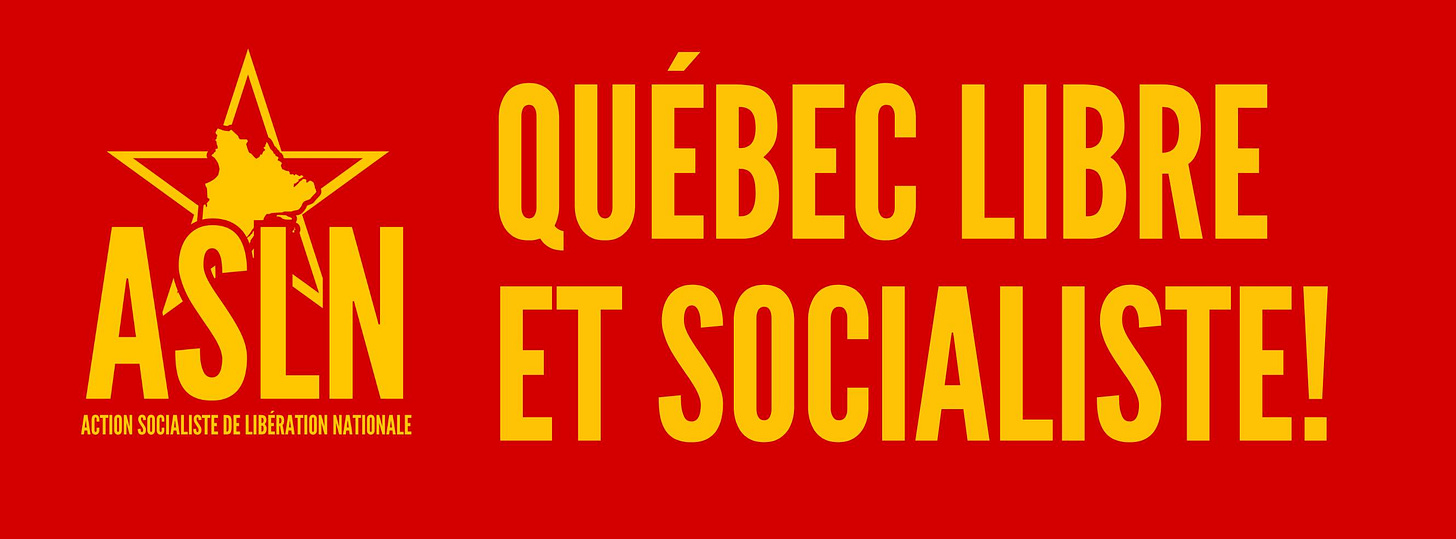Billy Savoie and Quebec’s Fight for Freedom
A fiery young teacher leads Quebec’s new generation towards independence.
As Canada grapples with inflation, housing crises, and federal overreach, young activists are reigniting the dream of an independent Québec libre. Billy Savoie is a teacher and a Quebec patriot, a bold Quebec independence crusader whose fiery rhetoric and grassroots campaigns challenge the status quo. From street protests to viral social media blasts, Savoie embodies the frustrations of a generation tired of Ottawa’s grip. This conversation with Mr. Savoie explores the history of Quebec independence movements, the resurgence of separatist fervor, its ties to broader discontent, and Savoie’s voice amidst the decay of modern Canada.
Mr. Savoie, please contextualize modern Quebec and how you came to attend the recent march in Montreal which marked the 1995 Quebec Referendum (and explain what that is).
Since the conquest by the British Empire in 1760, the French-Canadian people of Quebec have been fighting for their national independence for nearly 300 years. Sometimes adopting an offensive posture, at other times a defensive one. In 1837-38, there was the Patriots’ Rebellion. In 1960, there was the Quiet Revolution. In 1970, there was the October Crisis. In 1980, there was the first referendum on sovereignty. In 1995, there was the second referendum on sovereignty.
Regarding the 1995 referendum on sovereignty, considerable evidence indicates that it was rigged by the Canadian government. With a 93.52% voter turnout, 49.42% voted yes and 50.58% voted no. The Gomery Commission (established by the Canadian federal government) and the Grenier Commission (established by the Quebec provincial government) proved that the Canadian government committed fraud involving illegal investments of $332 million to finance the activities of the “No” campaign. These funds were used to purchase Canadian flags, organize demonstrations, and produce advertisements. Furthermore, in the weeks leading up to the referendum vote, many immigrants, primarily Anglophones, were rapidly granted citizenship so they could vote “No.”
Our organization of Marxist-Leninist decolonial patriots, the Socialist Action of National Liberation (ASLN), participated in the March for Quebec Independence on October 25th, organized in Montreal to mark the 30th anniversary of the 1995 referendum. In a context where the national question is back on the agenda in Quebec—among young people under 18 to 34 years old (56% in a poll conducted on August 8th)—the Parti Québécois wants to organize a third referendum on sovereignty and is currently leading in the polls for the next elections in 2026.
How has the current economic situation in Canada led to the rebirth of provincial separatism in Quebec?
The forced deindustrialization of the economy is causing Quebecers to lose many jobs. Let me give you an example. In my rural region of Saguenay-Lac-Saint-Jean, two multinationals reign supreme. Rio Tinto Alcan for aluminum. Quebec is the fourth largest aluminum producer in the world. However, in the 1970s, Rio Tinto Alcan had approximately 12,000 employees in my region, compared to about 2,000 today. Then there’s Domtar for wood. Quebec is known for its forestry and wood products industry. However, since Domtar (owned by Indonesian Jackson Wijaya) acquired Resolute Forest Products (a Quebec company) in 2023, many small sawmills have closed and many jobs have been lost. There are also conflicts with Indigenous communities regarding forest and environmental protection. Finally, Hydro-Québec is a public utility. Since hydroelectricity was nationalized by René Lévesque in 1963, Hydro-Québec has enjoyed a monopoly in this energy sector. Quebec had the largest hydroelectric dams in the world. China sent its engineers here for training. However, for several years now, Hydro-Québec has been gradually privatized, which is reducing Quebec’s energy sovereignty.
What personal experiences or historical events first inspired you to advocate for Quebec’s separation from Canada?
The massive influx of illegal immigrants and/or temporary workers since 2015 under Justin Trudeau’s Liberal Canadian government has been very shocking for most Quebecers, especially since the pandemic. Personally, what made me feel nationalistic was seeing that in many Montreal neighborhoods, French is no longer even spoken. This is increasingly the case in the suburbs as well, and even in some rural villages in recent years. It’s the most emotional and sensitive issue for Quebecers because we are a national minority within Canada. Furthermore, Quebec has a very homogeneous ethnicity and culture (French Canadian) compared to the rest of North America. Even before discussing economic issues, most Quebecers talk about immigration because they fear losing their historical culture and the French language. Mark Wiseman’s Century Initiative (he is president of BlackRock Canada and Prime Minister Mark Carney’s immigration advisor) aims for Canada to have a population of 100 million by 2100. For many Quebecers, this is reminiscent of Lord Durham’s plan in 1840, which aimed to “assimilate the sub-race of French Canadians” through mass immigration of Scots and Irish.
How do you respond to critics who argue that Quebec separatism would economically harm the province, given its reliance on federal transfers?
In October 2023, the Parti Québécois (PQ) published “A Quebec Free to Make Its Own Choices.” It was validated by six economists. The budget estimates that an independent Quebec could recover up to $82.3 billion, including $36 billion in personal income taxes and $15.4 billion in consumption taxes. Another example is that eliminating the overlapping responsibilities of federal and provincial governments would generate $8.8 billion. According to the document, Quebec as a country could rank second in the G7 for its debt-to-GDP ratio (behind Germany) and third for its net debt. Quebec independence would also allow Quebecers to plan their economy according to their own national interests instead of being forced to adjust their decisions to external priorities, such as Alberta’s oil interests or Ottawa’s financial interests, which are often at odds with Quebec’s economic vision.
What personal woes have you faced due to your views?
Since 2020, the Canadian federal government has indirectly funded the antifa movement through organizations such as the Canadian Anti-Hate Network, which has received over $908,400 in public funds. Unfortunately, antifa has infiltrated part of the Quebec separatist movement, notably through the Québec Solidaire party and the citizens’ group Oui-Québec. They divide our movement and often try to intimidate us when we organize marches for Quebec independence. On October 25, a defamatory article about me was published by Montréal Antifa, triggering a coordinated wave of complaints aimed at getting me fired. I am a high school teacher, and after five years of service, I am currently temporarily suspended from my duties while my employer conducts an investigation into my social media posts. Shortly after, TVA Nouvelles aired a report accusing me of violent extremism and Nazi sympathies, using excerpts taken out of context to portray me as an admirer of Adolf Hitler. This is very surprising, since in my speeches I continually say that “immigrants are our friends.” Despite this attack, a video of the TV report shared on TikTok has garnered over 315,000 views, and the vast majority of comments support me, with messages like “Free Billy.” It’s interesting to note that many openly leftist, federalist, or bourgeois-leaning teachers express themselves freely online without ever being bothered by antifa. We know others like me who have been targeted by antifa. These targeted attacks clearly demonstrate that it’s not “extremist ideas” that they’re trying to combat, but any Quebec independence or nationalist discourse that breaks with the established order. Throughout Quebec’s history, patriots have always been repressed by the Canadian colonial apparatus. The fact that we are once again subjected to this kind of attack only confirms one thing: we are continuing their struggle—and for us, that is an honor.
In your view, what are the key cultural and linguistic differences that make Quebec fundamentally incompatible with the rest of Canada?
We are often made to forget this through the media and our colonial education system, but our majority ethnicity is French Canadian, our language is French, and our cultural heritage comes from the Catholic Church. Quebecers are a close-knit, fun-loving people who enjoy a good laugh. They are very hardworking and tend to see themselves as victims. Unlike other Canadians or Americans, Quebecers dislike conflict and prefer consensus. Quebecers are friends of Indigenous peoples, and in rural areas, they are often ethnically mixed. It is sometimes difficult to distinguish a Quebecer from an Indigenous person. I myself am a Quebecer, I have Indigenous ancestry, and I was raised by a member of the Atikamekw Nation.
What role do you believe Indigenous communities in Quebec should play in any future independence movement?
Since 1760, Quebecers and several Indigenous nations have waged a common struggle against British colonialism. Today, federal Canada divides this historical solidarity by granting privileges to certain Indigenous communities—particularly the Iroquois, often aligned with Ottawa—while other nations, such as the Algonquins, Innu, and Huron, remain close to Quebec. Quebecers and Indigenous peoples remain colonized by Canada: our liberation can only be achieved together. Once the colonial state is abolished, a new political organization must be built, negotiated on an equal footing between free nations.
How has the failure of past referendums, such as those in 1980 and 1995, influenced your current strategies for promoting sovereignty?
The Parti Québécois’ strategy is based on holding a third referendum, and we support this approach. However, the failures of 1980 and 1995 taught us that relying solely on institutional mechanisms is insufficient to liberate a colonized people. That is why, alongside supporting the referendum, we are preparing the ground for a longer-term struggle, notably by mobilizing Generation Z and, gradually, Generation Alpha. Should a new referendum fail—or be sabotaged as in 1995—we envision an intensification of the national and class-based decolonization struggle over the next five to ten years. This will involve intensive propaganda work on social media platforms like TikTok, as well as organizing on the ground. Recently, we organized the Young Patriots Colloquium, where young anti-imperialist activists, from both the right and the left, were able to debate strategy and their vision of an independent Quebec. Comrades from the American Communist Party (ACP) were present at this event. I gave a speech in which I drew inspiration from Dugin’s Fourth Theory: although I am personally a Marxist-Leninist, with other Quebec youth organizations we are creating a movement that transcends the rigid political categories of the 20th century (liberalism, Marxism, etc.) to build a rooted and truly sovereign political force.
How do you address concerns from English-speaking Quebecers or other minorities about their rights in an independent Quebec?
Quebecers are generally very kind and open towards foreigners. However, in a context of mass immigration, the infiltration of leftism, and the accelerated Islamization of society, the Quebec provincial government adopted the secularism law, which prohibits public sector employees from wearing headscarves. In the rest of Canada, this measure is perceived as identity-based or racist. However, for the majority of Quebecers, it is a good thing. The view of most Quebecers is this: immigrants and minorities are our friends, but they must respect our culture. The founding fathers of Quebec sociology—Fernand Dumont, Guy Rocher, and others—speak of a culture of convergence based on the “historical Francophone majority.” To the extent that an Anglophone or a minority (Muslim, for example) respects this national culture and decides to integrate into it, they can live peacefully in Quebec. The cultural and linguistic rights of minorities will be respected. As decolonial Marxist-Leninists, at the Socialist Action for National Liberation (ASLN), we maintain that a working-class movement can unite the majority French Canadian ethnic group and the minority ethnic groups of the Quebec nation.
What relationship should an independent Quebec have with Canada, the United States, France, and the larger Francophone world?
It’s hard to say. It all depends on the balance of power and which classes are in power.
Currently, the Bloc Québécois (a very bourgeois Quebec nationalist party with elected officials in the Canadian federal government) actively supports Israel, Ukraine, and imperialism. Its strategy is to ally with Canada in order to negotiate tariffs with Trump. Very often, this is done at the expense of Quebecers’ economic interests.
On the other hand, the Parti Québécois (a Quebec nationalist party with elected officials at the provincial level) tends to adopt a neutral or non-aligned position on international issues. This is interesting. It did express a tentative position in favor of Ukraine in 2022, but since then there have been no public statements. The PQ rarely speaks on international issues. In fact, a few years ago, a vote was held on the question of whether Quebec should withdraw from NATO. The proposal was defeated, but nearly 50% of the members present voted “Yes.” This demonstrates a division.
For us, Marxist-Leninist patriots of the Socialist Action for National Liberation (ASLN), our vision is that of Quebec’s Juche movement. Once free, as a small nation, we will prioritize the economic, political, and military self-sufficiency of our Republic above all else. However, we would like Quebec to leave NATO and join BRICS+. A multipolar world is more advantageous for Quebec than a unipolar American world. Regarding the current tariff negotiations with Trump, our organization demands that Quebec send its own delegation instead of letting Canada negotiate on its behalf.
Regarding the Francophonie, we want to build ties with Françafrique. In fact, our organization sent a delegation to the WAP21 conference in Dakar, Senegal, in 2024. We were surprised by the natural relationship we developed with leaders from different African countries (Mauritania, Senegal, Guinea, Mali, Niger, Burkina Faso, etc.) due to the French language we speak.
In Conclusion
As Quebec’s sovereignty movement surges amid economic despair and cultural erosion, Billy Savoie emerges as its defiant voice, along with his comrades in the Socialist Action of National Liberation (ASLN). From Saguenay’s deindustrialized mills to Montreal’s October 25 march commemorating the allegedly rigged 1995 referendum (49.42% Yes, tainted by federal fraud and rushed citizenships), Savoie channels centuries of resistance: Patriots’ Rebellion, Quiet Revolution, October Crisis. He ties separatism’s rebirth to job losses at Rio Tinto and Domtar, Hydro-Québec’s creeping privatization, and Trudeau’s immigration waves drowning French in once-homogeneous neighborhoods. Defying antifa smears, suspension from teaching, and media hit pieces, Savoie envisions a decolonial Quebec allied with Indigenous nations, exiting NATO for BRICS+, and embracing self-reliance. In Savoie’s fight, Quebec’s liberation is not nostalgia, it’s survival.







Pas de version française de l'entretien ?